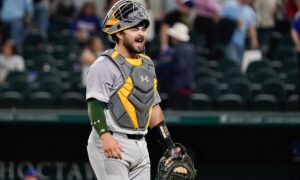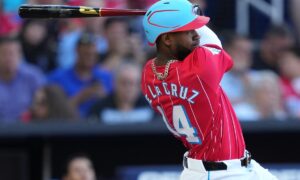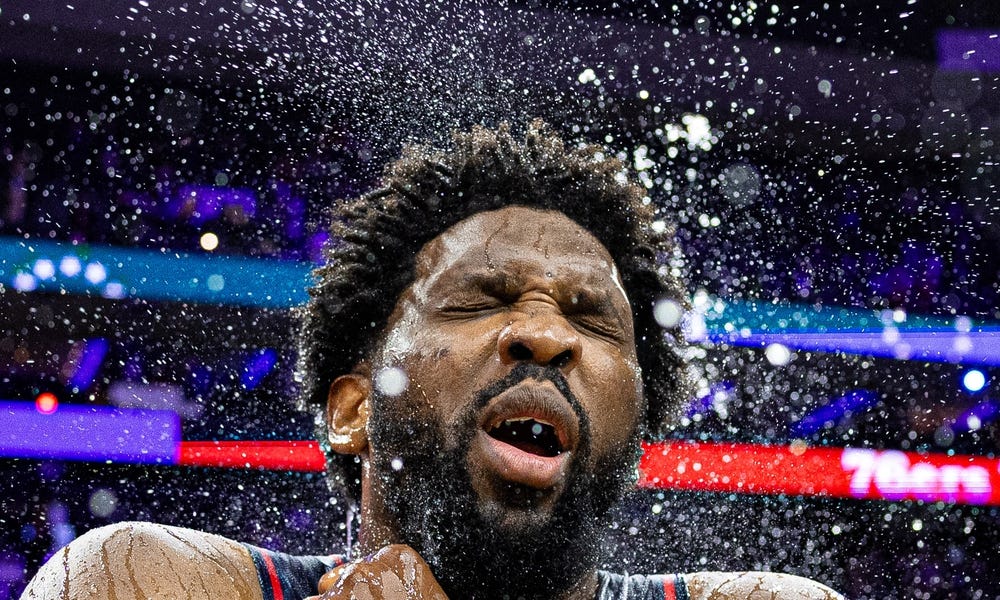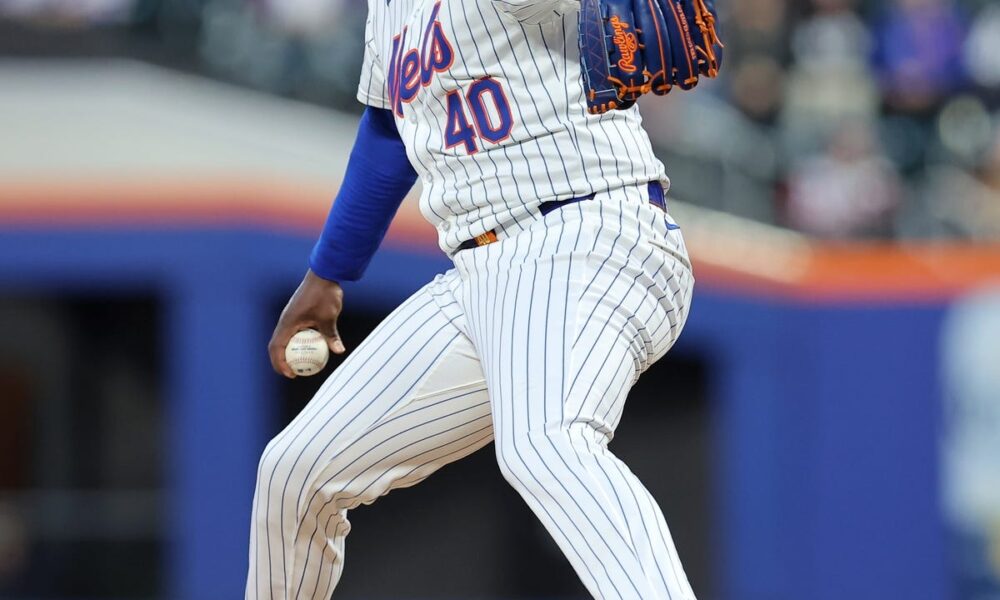Featured Articles
-

 5MLB Game Previews, Picks & Predictions
5MLB Game Previews, Picks & PredictionsNationals vs Dodgers Prediction, Pick, Preview & Betting Odds – MLB 4/17/24
-

 10NBA Game Previews, Picks & Predictions
10NBA Game Previews, Picks & PredictionsHawks vs Bulls Prediction, Pick, Preview & Betting Odds for 4/17/24
-

 11NHL Game Previews, Picks & Predictions
11NHL Game Previews, Picks & PredictionsBlues vs Stars Prediction, Pick, Preview & Betting Odds for 4/17/24
What’s Hot
-

 5MLB Game Previews, Picks & Predictions
5MLB Game Previews, Picks & PredictionsCubs vs Diamondbacks Prediction, Pick, Preview & Betting Odds – MLB 4/17/24
Check out our free Cubs vs Diamondbacks pick and preview for this MLB matchup...
-

 8MLB Game Previews, Picks & Predictions
8MLB Game Previews, Picks & PredictionsYankees vs Blue Jays Prediction, Pick, Preview & Betting Odds – MLB 4/17/24
Check out our free Yankees vs Blue Jays pick and preview for this MLB...
-

 7NHL Game Previews, Picks & Predictions
7NHL Game Previews, Picks & PredictionsMaple Leafs vs Lightning Prediction, Pick, Preview & Betting Odds for 4/17/24
Check out our free Maple Leafs vs Lightning prediction for this NHL matchup in...
Latest Knup Sports Show
Latest Posts at KnupSports.com
-

 NBA Game Previews, Picks & Predictions
NBA Game Previews, Picks & PredictionsHeat vs 76ers Prediction, Pick, Preview & Betting Odds for 4/17/24
Check out our Heat vs. 76ers prediction to get our insight on to who will win and cover the spread in Philadelphia.
-

 NBA Game Previews, Picks & Predictions
NBA Game Previews, Picks & PredictionsHawks vs Bulls Prediction, Pick, Preview & Betting Odds for 4/17/24
In this NBA regular season preview between Hawks and Bulls, see who like to win the game and cover the spread.
-

 2MLB Game Previews, Picks & Predictions
2MLB Game Previews, Picks & PredictionsGuardians vs Red Sox Prediction, Pick, Preview & Betting Odds – MLB 4/17/24
Check out our free Guardians vs Red Sox pick and preview for this MLB matchup at Fenway Park. See who we like...
-

 6MLB Game Previews, Picks & Predictions
6MLB Game Previews, Picks & PredictionsAngels vs Rays Prediction, Pick, Preview & Betting Odds – MLB 4/17/24
Check out our free Angels vs Rays pick and preview for this MLB matchup at Tropicana Field. See who we like to...
-

 8MLB Game Previews, Picks & Predictions
8MLB Game Previews, Picks & PredictionsRockies vs Phillies Prediction, Pick, Preview & Betting Odds – MLB 4/17/24
Check out our free Rockies vs Phillies pick and preview for this MLB matchup at Citizens Bank Park. See who we like...
-

 8MLB Game Previews, Picks & Predictions
8MLB Game Previews, Picks & PredictionsReds vs Mariners Prediction, Pick, Preview & Betting Odds – MLB 4/17/24
Check out our free Reds vs Mariners pick and preview for this MLB matchup at T-Mobile Park. See who we like to...
-

 5MLB Game Previews, Picks & Predictions
5MLB Game Previews, Picks & PredictionsCubs vs Diamondbacks Prediction, Pick, Preview & Betting Odds – MLB 4/17/24
Check out our free Cubs vs Diamondbacks pick and preview for this MLB matchup at Chase Field. See who we like to...
-

 9MLB Game Previews, Picks & Predictions
9MLB Game Previews, Picks & PredictionsCardinals vs Athletics Prediction, Pick, Preview & Betting Odds – MLB 4/17/24
Check out our free Cardinals vs Athletics pick and preview for this MLB matchup at Oakland Coliseum. See who we like to...
-

 5MLB Game Previews, Picks & Predictions
5MLB Game Previews, Picks & PredictionsNationals vs Dodgers Prediction, Pick, Preview & Betting Odds – MLB 4/17/24
Check out our free Nationals vs Dodgers pick and preview for this MLB matchup at Dodger Stadium. See who we like to...
-

 8MLB Game Previews, Picks & Predictions
8MLB Game Previews, Picks & PredictionsYankees vs Blue Jays Prediction, Pick, Preview & Betting Odds – MLB 4/17/24
Check out our free Yankees vs Blue Jays pick and preview for this MLB matchup at Rogers Centre. See who we like...
-

 6MLB Game Previews, Picks & Predictions
6MLB Game Previews, Picks & PredictionsPirates vs Mets Prediction, Pick, Preview & Betting Odds – MLB 4/17/24
Check out our free Pirates vs Mets pick and preview for this MLB matchup at Citi Field. See who we like to...
-

 10MLB Game Previews, Picks & Predictions
10MLB Game Previews, Picks & PredictionsRangers vs Tigers Prediction, Pick, Preview & Betting Odds – MLB 4/17/24
Check out our free Rangers vs Tigers pick and preview for this MLB matchup at Comerica Park. See who we like to...
-

 8MLB Game Previews, Picks & Predictions
8MLB Game Previews, Picks & PredictionsGiants vs Marlins Prediction, Pick, Preview & Betting Odds – MLB 4/17/24
Check out our free Giants vs Marlins pick and preview for this MLB matchup at loanDepot Park. See who we like to...
-

 10NBA Game Previews, Picks & Predictions
10NBA Game Previews, Picks & PredictionsHawks vs Bulls Prediction, Pick, Preview & Betting Odds for 4/17/24
Check out our free Hawks vs Bulls prediction for this NBA matchup in Chicago. See who we like to win and cover...
-

 11NHL Game Previews, Picks & Predictions
11NHL Game Previews, Picks & PredictionsOilers vs Coyotes Prediction, Pick, Preview & Betting Odds for 4/17/24
In this NHL regular season prediction between the Oilers and Coyotes, see who like to win the game and cover the puck...
-

 11NHL Game Previews, Picks & Predictions
11NHL Game Previews, Picks & PredictionsBlues vs Stars Prediction, Pick, Preview & Betting Odds for 4/17/24
In this NHL regular season prediction between the Blues and Stars, see who like to win the game and cover the puck...
-

 7NHL Game Previews, Picks & Predictions
7NHL Game Previews, Picks & PredictionsMaple Leafs vs Lightning Prediction, Pick, Preview & Betting Odds for 4/17/24
Check out our free Maple Leafs vs Lightning prediction for this NHL matchup in Tampa. See who we like to win and...
-

 45NBA Articles, Opinions & Blogs
45NBA Articles, Opinions & Blogs11 Best NBA Players Born in Michigan of All Time
Join us as we look at the best NBA players born in Michigan over the history of the game.
-

 155MLB Articles, Opinions & Blogs
155MLB Articles, Opinions & BlogsBest GMs in Baseball: MLB’s Masterminds
I've always had a fascination for "being the GM" in Major League Baseball! Back in the day we actually operated a website...
-

 213Horse Racing Articles, Opinions & Blogs
213Horse Racing Articles, Opinions & BlogsChurchill Downs Seating Guide for the Kentucky Derby
Held annually at Churchill Downs in Louisville, Kentucky, the Kentucky Derby marks the first leg of the prestigious Triple Crown series. The...









